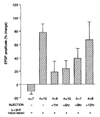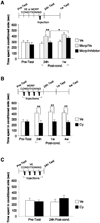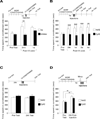The role of protein synthesis during the labile phases of memory: revisiting the skepticism
- PMID: 17928243
- PMCID: PMC2348569
- DOI: 10.1016/j.nlm.2007.08.007
The role of protein synthesis during the labile phases of memory: revisiting the skepticism
Abstract
Despite the fact that extensive evidence supports the view that phases of de novo protein synthesis are necessary for memory formation and maintenance, doubts are still raised. Skeptics generally argue that amnesia and the disruption of long-term synaptic plasticity are caused by "non-specific effects" of the reagents or approaches used to disrupt protein synthesis. This paper attempts to clarify some of these issues by reviewing, discussing and providing results addressing some of the major critiques that argue against the idea that de novo protein synthesis is necessary for the stabilization of long-term memory.
Figures





References
-
- Alberini CM, Ghirardi M, Metz R, Kandel ER. C/EBP is an immediate early gene required for the consolidation of long-term facilitation in Aplysia. Cell. 1994;76:1099–1114. - PubMed
-
- Alberini CM. Mechanisms of memory stabilization: are consolidation and reconsolidation similar or distinct processes? Trends in Neuroscience. 2005;28:51–56. - PubMed
-
- Alberini CM. Reconsolidation: The Samsara of Memory Consolidation. Debates in Neuroscience. 2007;1:17–24.
-
- Anokhin KV, Tiunova AA, Rose SP. Reminder effects - reconsolidation or retrieval deficit? Pharmacological dissection with protein synthesis inhibitors following reminder for a passive-avoidance task in young chicks. European Journal of Neuroscience. 2002;15:1759–1765. - PubMed
-
- Athos J, Impey S, Pineda VV, Chen X, Storm DR. Hippocampal CRE-mediated gene expression is required for contextual memory formation. Nature Neuroscience. 2002;5:1119–1120. - PubMed
Publication types
MeSH terms
Substances
Grants and funding
LinkOut - more resources
Full Text Sources
Medical

